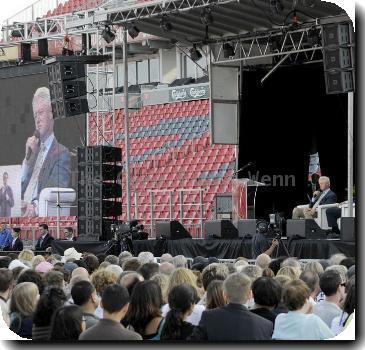APNewsBreak: Haiti premier says government to appropriate land to build quake victims’ camps
By APFriday, February 19, 2010
APNewsBreak: Haiti premier says govt to take land
PORT-AU-PRINCE, Haiti — Prime Minister Jean-Max Bellerive says Haiti’s government will appropriate privately held land to build temporary camps for earthquake victims.
Bellerive tells The Associated Press that the government owns some land but not nearly enough, meaning he has no choice but to take over private land. The law provides for this as long as the owners are fairly compensated.
International aid groups say hundreds of hectares (acres) are needed to get quake victims out of overcrowded makeshift camps in public parks and lots in Port-au-Prince.
Officials say 1.2 million Haitians were left homeless by the Jan. 12 quake, about half of them in the capital. Bellerive spoke with the AP on Thursday.
THIS IS A BREAKING NEWS UPDATE. Check back soon for further information. AP’s earlier story is below.
PORT-AU-PRINCE, Haiti (AP) — Haitian Prime Minister Jean-Max Bellerive worries his government could face collapse as political opponents capitalize on its inability to respond strongly to the Jan. 12 earthquake.
The battered nation’s second-in-command told The Associated Press during a 40-minute interview that he has two immediate fears — how the 1.2 million people living in Port-au-Prince’s streets, hillsides and gullies will deal with the impending rainy season and the danger of political divisiveness.
“You have the feeling that everyone is trying to do his little part and accuse the other one of not doing his part,” including Haitian politicians, international aid groups and the business community, Bellerive said. “Everyone is trying to create conflict when we have the same enemy right now: It’s misery, it’s disaster.”
He had been prime minister for two months when the earthquake struck, having replaced a predecessor ousted mainly by senators from Preval’s party.
Bellerive is the sixth person to hold the post of head of government and No. 2 to the president since 2004 in this politically unstable nation. Preval took power under a U.N.-sanctioned election after two years of a U.S.-backed interim government that filled the void following the 2004 ouster of President Jean-Bertrand Aristide.
As an economist whose prior responsibilities included coordinating international aid for this deeply poor nation, Bellerive said he understands criticism that Haiti’s leaders didn’t do enough to help in the days after the magnitude-7 earthquake killed 200,000 people and leveled 38 percent of the capital, including nearly every government ministry.
“Because we didn’t have any administration we could not give the services the population is entitled to. So they say there isn’t any government,” he said.
Since the quake, Bellerive said, he has spent sleepless nights worrying about impending rains — and their threat to cause landslides and floods that are constant killers in this Caribbean nation.
He said he has struggled to find solutions for those displaced by the quake. Most are still in the streets, trying to cope with poor sanitation and not enough food.
Then there is the potential for a constitutional storm.
A legislative election scheduled for this month has been canceled, threatening parliament’s legitimacy. A presidential election planned for later in the year is also in question, with Preval’s term expiring in 12 months.
In a country where peaceful transitions to power are rare, that could give opportunities to political rivals, Bellerive said.
“I am not asking for a truce, but I believe we have a serious problem that we have to face right now as a nation,” he said. “The government is not able to resolve this situation alone.”
Also on Thursday, U.N. humanitarian chief John Holmes called for improved coordination of relief efforts five weeks after the devastating quake, from a lack of shelter to rubble removal and sanitation.
He was commenting on an e-mail he sent to U.N. staff that said an uneven response to the disaster “is leading others to doubt our ability to deliver.”
The e-mail’s contents, first reported by The Washington Post, were confirmed by a U.N. official in Haiti who spoke on condition of anonymity because of the matter’s sensitivity.
Holmes said in the e-mail that he was “disappointed” that several of the organizational committees known as “clusters,” which coordinate delivery of aid, hadn’t yet assessed needs or developed plans to respond.
The U.N.’s losses in Haiti were themselves staggering: Its headquarters collapsed completely, and 92 U.N. staff were confirmed killed with seven still missing.
Earlier in the day, the United Nations asked donors for $1.44 billion to help Haitians recover. The appeal, which covers needs in 2010, is the largest ever for a natural disaster.
U.N. Secretary-General Ban Ki-moon and his special envoy for Haiti, former U.S. President Bill Clinton, launched the appeal at a meeting with diplomats from many of the 192 U.N. member states.
“Before last month’s disaster we had a plan for Haiti’s long-term development and reconstruction,” Ban said. “Our challenge today is to reformulate that plan to help Haitians build back better.”
With the rainy season approaching, Ban said, the top priorities are to provide shelter, sanitation and humanitarian assistance.
Clinton echoed that call, telling the diplomats that while the appeal is important to begin long-term rebuilding, the world must first help millions of Haitians get through daily post-quake struggles with disease, loss of shelter and shortages of food.
Donors have already pledged $673 million — meaning $768 million is still needed, said Stephanie Bunker, spokeswoman for the U.N. Office for the Coordination of Humanitarian Affairs.
Associated Press Writers Frank Bajak in Port-au-Prince and Edith M. Lederer at the United Nations contributed to this report.
Tags: Bill Clinton, Caribbean, Climate, Emergency Management, Foreign Aid, Geography, Haiti, Latin America And Caribbean, Weather Patterns

